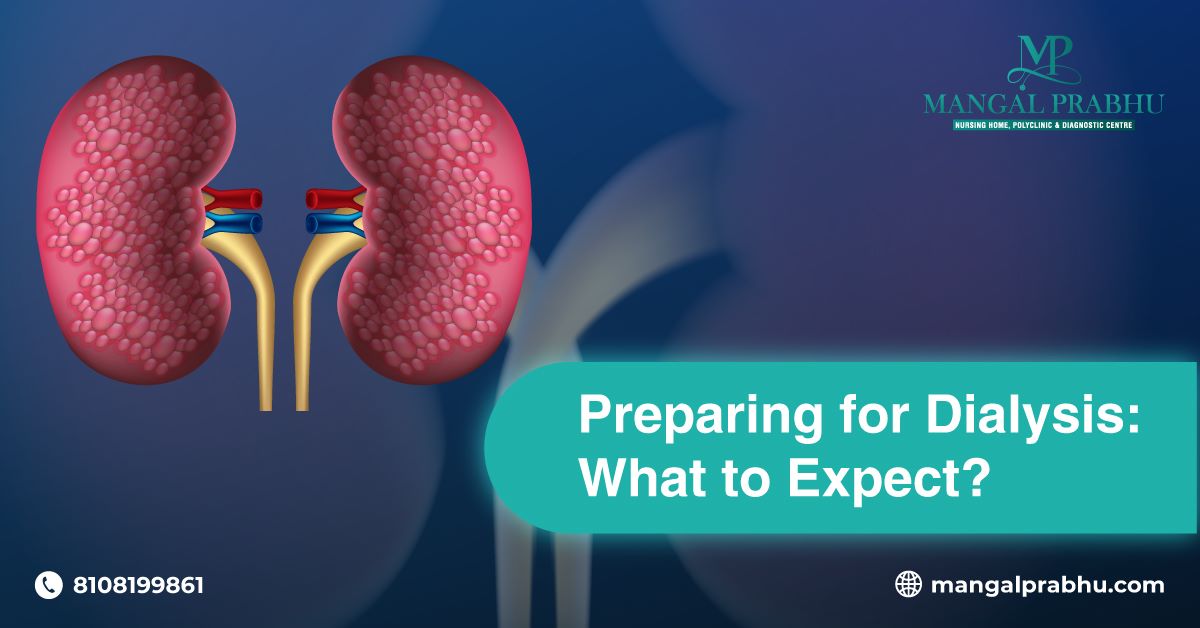
Preparing for Dialysis: What to Expect?
Your kidneys can fail due to many reasons. Chronic Kidney Failure, diabetes, lupus, and other issues can affect your kidney function, resulting in the buildup of toxins in your bloodstream. A nephrologist in Navi Mumbai recommends dialysis when your kidney function drops to a certain level, usually 15 percent. Let’s discover more about dialysis benefits, side effects, and preparation tips.
Types of Dialysis
Dialysis is performed in two ways:
- Hemodialysis: The blood is transferred for filtering through a dialyzer to an external machine. The purified blood is then returned to your body. It is a 3-4 hour session, performed thrice a week.
- Peritoneal Dialysis: In Peritoneal dialysis, a catheter is placed in your abdomen and is connected to the bag containing the dialysis solution. You can drain the liquid into another empty bag once it has collected the waste from your bloodstream. The procedure must be repeated 3-4 times a day.
How to Prepare for Dialysis
The preparation for dialysis is different for both types of procedures. For hemodialysis, the Arteriovenous fistula (AV) is created in your arm by joining an artery with the vein to create a broader blood vessel.
If you have too narrow blood vessels for this procedure, the surgeon might connect the two using a hollow tube, called a graft. By expanding the size of the blood vessels, AV ensures smoother blood flow in and out of your system. If it’s an emergency, the surgeon might insert a tube through your neck to get quick access to the blood vessels.
Also Read: What Is The Importance Of Dialysis? Which Patients Require It The Most?
For both procedures, there are certain restrictions regarding your food and fluid intake. Your healthcare provider will advise you to limit the fluid, as the dialysis procedure can’t remove the waste that’s accumulated in 3-4 days from your blood.
You also need to watch your diet. Excess intake of sodium, potassium, and phosphorus can increase the level of these minerals in your bloodstream quickly. It’s best to work with a dietician to have the best diet plan for your treatment.
Benefits of Dialysis
The biggest advantage of dialysis is that it removes waste and extra fluid within your body to prevent them from building up and damaging your organs. It also maintains the levels of sodium and potassium in your body. Moreover, dialysis regulates your blood pressure and prevents kidney diseases.
Possible Risks of Dialysis
Inserting a catheter in your abdomen carries significant risks. For example, bacteria and contaminants can enter your stomach through this catheter, resulting in vomiting, nausea, and fever. Likewise, hemodialysis carries the risk of infection around the site of the incision. Here are some side-effects of dialysis:
- Muscle cramps
- Low blood pressure
- Weakness from sudden blood fluctuation
- Blood loss
- Hernia
A kidney transplant is a good alternative for those who can’t schedule regular visits to the dialysis center in Navi Mumbai.
Conclusion
Every person’s body reacts differently to dialysis. Your risk of developing side effects also depends on your health condition and the type of dialysis you are considering. Discuss your risk factor with the healthcare provider to ensure smooth dialysis sessions.

When to Consult a Doctor During Pregnancy?
The two colored lines on the pregnancy test can induce a lot of emotions in the mother-to-be. You might experience fear, excitement, and a whole lot of emotions. No matter whether the pregnancy was a surprise or planned, or if it’s your first or fourth child, having a healthy pregnancy is the ultimate goal of every parent. That’s what the pregnancy care hospital in Navi Mumbai helps you achieve. But when should you see a doctor? Well, the sooner the better.
Plus Sign on the Pregnancy Test
Each pregnancy is different and the level of care each woman needs during this phase is also different. Before you consult a doctor, take a pregnancy test at home. The ideal time to do that is when you have missed a period. Women who have PCOS or menstrual problems that result in missed periods should watch out for other signs of pregnancy, such as nausea and vomiting, backache, frequent urination, tender and painful breasts, food cravings, changes in smell and taste, etc.
An ideal time to detect a pregnancy is around the 8th week. The first week of your pregnancy is your last period. So, the first day of your last period is the starting date of your pregnancy and by the time you have missed your period, you are already four weeks pregnant. That’s because it’s not possible to identify when you conceived before your missed period.
Also Read: 10 Most Common Pregnancy Symptoms And How To Manage Them
Why Visit the Doctor Soon?
Obstetricians & gynecologists in Navi Mumbai advise pregnant women to see a doctor as soon as their home pregnancy test is positive. The gynecologist will check your due date to figure out how far along you are. They will see if there is any age or family-related risk factor or any possibility of complications that could pose pregnancy risk. They will recommend prenatal supplements, as well as different tests that confirm your pregnancy.
During pregnancy, the thick formation of the mucus plug is observed in your uterus. It closes your womb and prevents any bacteria or germs from entering the womb and harming your baby. It stays there until you near the delivery date. By six weeks, the doctor can hear your baby’s heartbeat.
Is It Too Late?
It’s better to see a doctor as soon as you take the pregnancy test. But it’s common for women to detect a pregnancy when they are 7-8 weeks pregnant. If you have diabetes, high blood pressure, or any medical condition that can make your pregnancy risky, it’s advisable to see a doctor earlier. Those with ectopic pregnancy, a history of miscarriage, and other pregnancy-related issues should keep in touch with a gynecologist. Some may also witness bleeding, which can indicate a complication.
You can switch doctors, but it’s best to have the same professional and team throughout your pregnancy. On your first visit, the doctor will confirm your pregnancy, check your family history, and ask about previous pregnancy-related complications. Take all your medical reports with you and share your medical history with the doctor.

How To Prevent Hernia?
Hernia occurs when an internal organ or your abdominal tissue pushes through the muscle wall, leading to a bulge in your abdomen. Hernia can be avoided, but whether it can be prevented or not depends on the type. Hernia that occurs following abdominal surgery or childbirth, for example, cannot be predicted or avoided. You will have to consult a hernia surgeon in Navi Mumbai to determine a suitable treatment.
What Causes Hernia?
Hernia is mostly caused by strain on your abdominal muscles or the groin because of weakened muscles. Strenuous exercises, pregnancy, obesity, constipation, and constant coughing are the few common causes of hernia. The bulge worsens as more pressure is applied to the abdominal muscles.
Those who have had multiple pregnancies, a history of abdominal surgery, or perform activities that put excessive pressure on their abdominal walls are at high risk of developing umbilical hernia. The type of hernia is defined based on the area it occurs. A vast majority of the hernias are classified as inguinal hernias that occur when the part of your intestine pushes through the weakened muscle and develops in your groin.
Unfortunately, there’s not much you can do about the weakened muscles that lead to the inguinal hernia, but there are ways to prevent it from worsening. Below we’ve shared some steps recommended by the hernia treatment center in Navi Mumbai for those at a higher risk of developing a hernia.
Also Read: What Is Hernia In Women?
Tips for Preventing Hernia
The right ways to prevent a hernia depend on the type of hernia. An incisional hernia, for instance, develops in your abdomen around the site of the incision. It happens when the intestine pushes through the weakened area. Sadly, there’s not much you can do about it, except for taking general precautions. For other types of hernias, here’s what can help.
1. Lose Weight:
It’s easier said than done. However, obesity is one of the common causes of hernia, and shedding those extra pounds can definitely help. The excess body fat puts extreme pressure on your abdominal wall when you move, sit, stand, or perform any strenuous exercise. It’s advisable to discuss your weight goals with the doctor and develop a diet and exercise plan that works for you.
2. Get Exercise Regularly:
Exercising keeps your body in shape, strengthens muscle walls, and prevents different types of hernias. But exercises that put too much pressure on your abdominal wall can be risky. Pilates, sit-ups, aerobic activities, and Yoga are a few light exercises that may help. You should avoid squats, jumping, and other strenuous exercises.
3. Avoid Constipation:
Take fiber supplements and drink sufficient water to avoid constipation. If increasing your fiber intake, hydration, and lifestyle changes have not helped, consider taking laxatives. Painkillers and anesthesia are the common causes of constipation. And straining during the bowel movement after surgery will particularly increase your risk of getting a hernia.
Other than that, avoid smoking and heavy lifting. Get treatment for an enlarged prostate and persistent coughing to prevent strain on your abdominal muscles.
Conclusion:
In conclusion, healthy behaviors and thoughtful decisions are key to preventing hernias. People can dramatically lower their risk of getting a hernia by keeping a healthy weight, using proper lifting techniques, exercising frequently, and giving up smoking. Furthermore, being aware of any signs and obtaining immediate medical care when required can aid in avoiding complications and encourage early treatment. When it comes to hernias, always remember that prevention is always better than cure.

How to Sleep After ACL Surgery?
Anterior Cruciate Ligament or ACL surgery removes the torn ligament from your knee and replaces it with an artificial one to restore your knee function. The ligament could be either removed fully or preserved, depending on the severity of the injury. Your orthopedic surgeon in Navi Mumbai will brief you on the postoperative recovery.
Although the surgery doesn’t usually take more than 2 hours, patients might experience discomfort for a few days following the operation. The biggest question is how do you sleep during the recovery phase? Which posture is the best? Let’s find out.
Use Compression Stockings to Prevent Blood Clots
You need to wear compression stockings for 2-3 weeks post your ACL reconstruction surgery in Navi Mumbai. It helps prevent blood clot formation on the treated site and reduces pain and inflammation. It also helps you sleep comfortably.
You may have to continue the use of compression stockings at least until the sutures have not been removed and healed. Keep your affected area covered in this wrap every day and for 24 hours. You can remove it when taking a shower or changing the wrap.
Use Ice to Reduce Swelling
Post-surgical pain is common. While the doctor might give you over-the-counter medication to relieve the pain, you can try some home remedies too. Ice massage, for example, is a highly effective method to reduce swelling. Massage the injured site with ice packs twice a day—in the morning and before going to bed. This will reduce the pain, helping you fall asleep faster.
Also Read: Is Orthopedic Surgery Worth It?
Choose the Right Sleeping Position
After the surgery, you should sleep on your back with your treated leg raised slightly upward above your heart. Remember, finding the right sleeping position after ACL surgery is extremely important. A position that applies too much pressure on your affected leg will not only cause discomfort but can slow your healing.
Patients healing from ACL surgery should sleep in a supine position, i.e. on their back instead of the stomach or side. Put a soft pillow beneath your leg to elevate it comfortably. This will alleviate pain, improve blood circulation, and reduce muscle tension.
Clean Your Bandage Regularly
Infection after the operation can be avoided by cleaning your bandage frequently and keeping it dry at all times. Note that wet stockings will serve as the breeding ground for germs, leading to infection on the wounded site. Besides that, it creates moisture on the leg, which can slow down your healing. A good hygienic practice for patients undergoing ACL surgery would be to remove the bandage before going to sleep, apply ointment, and wrap a new bandage.
Take OTC for Pain Management
Pain makes it difficult to fall and stay asleep after the ACL surgery. You can take over-the-counter medication to reduce pain and swelling. The anti-inflammatory medication will relieve the pain and help you have a good night’s sleep.
However, prescription medication can have side effects and might lead to addiction if taken in inappropriate dosage. It’s advisable to discuss your condition and sleep issues with the doctor to find the best solutions.

NICUs and PICUs: What is the Difference?
Newborns are incredibly fragile and require intensive care, especially pre-term-born children. To ensure that your child doesn’t face any health-related concerns in their early years of development, there are neonatal care units in every hospital.
There are two intensive care units—NICU and PICU—for children. They share some similarities. The terms are also used interchangeably, but they are different. In this post, we’ll explore these neonatal care units and how NICU Doctors in Navi Mumbai offer the best care to your little ones.
What is NICU in Hospital?
When a baby lives inside the mother’s womb, they get their nutrients, oxygen, and blood supply through the placenta. A lot of things change when they are delivered. Some newborn babies require intensive medical care 24/7 because of complications during delivery or their low weight.
Neonatal Intensive Care Unit is for newborns that are born pre-term, weigh lower than 5.5 pounds, and are born with health issues. The unit comprises a team of professional healthcare providers and nurses that specialize in offering medical care to newborns. The system is equipped with the latest medical technology that monitors children throughout the day.
Pre-term babies are highly likely to spend the first few days in the NICU. It’s advisable to get to the NICU Hospital in Navi Mumbai that have a dedicated unit for newborn intensive medical care. This is especially important for women with complicated pregnancies.
What is PICU in Hospital?
Pediatric Intensive Care Unit (PICU) is for children who need specialized care. PICU is for kids that are a few months old and above. A child is admitted to the PICU when they are diagnosed with a critical illness that requires specialized care with regular monitoring, or if they get into an accident.
A child that experiences asthma and is facing difficulty breathing is admitted to the PICU. simply put, all kinds of pediatric issues that put the infant’s life in danger require a pediatric intensive care unit. Once the child gets the necessary treatment and their condition is stabilized, they will be sent back to the regular hospital or home.
Difference between NICU and PICU
Both NICU and PICU are for children, but the former is for newborns that need protection from germs and other contamination. These intensive care units have all the necessary equipment and trained medical staff that monitors the infant’s condition 24/7 and handle emergencies immediately.
PICUs are not for newborns. Even if the hospital where you have delivered the child has only the PICU, the healthcare specialist will recommend you transfer the kid to a hospital with a NICU facility. The biggest and only difference between NICU and PICU is the age.
Different Levels of Care at NICU
The level of care at the NICU is classified into different types, based on gestational maturity and weight. Babies weighing less than 1800 grams need level third care, while those born with a weight less than 1200 grams and are born before 30 weeks require level 1 care.
For neonates who need intensive medical care, the Neonatal Intensive Care Unit (NICU) offers specialized care. There are various levels of care available within the NICU, each catered to the unique need of each newborn.
Level I:
NICUs provide basic care for healthy babies, helping with feeding and keeping track of vital signs. They are often located in community hospitals.
Level II:
NICUs can provide moderately unwell newborns with care and a higher degree of assistance, including specialized tools and more sophisticated monitoring systems.
Level III:
Neonatal intensive care units (NICUs) are typically found in tertiary care facilities and offer comprehensive treatment for severely ill or preterm infants. These units have access to highly qualified medical staff, cutting-edge equipment, and surgical interventions when necessary.
To assure the greatest results for the most vulnerable babies, these units are equipped to manage complicated medical issues and offer round-the-clock care.
Conclusion:
In conclusion, NICUs and PICUs cater to distinct age groups and medical needs. NICUs focus on providing intensive care for newborns, especially premature or severely ill babies, while PICUs offer comprehensive care for newborns, young children, and teenagers up to age 18. Understanding these contrasts enables families to make informed decisions regarding their child’s level of care.
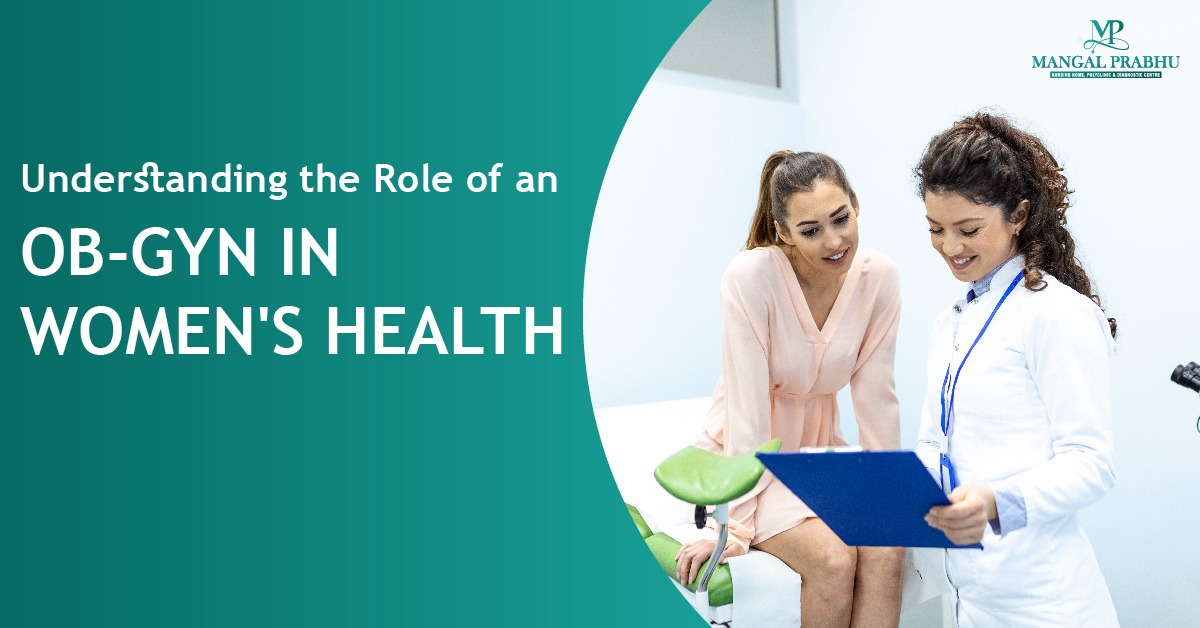
Understanding the Role of an OB-GYN in Women’s Health
Fertility and issues related to women’s reproductive health are increasing at an alarming rate these days. But, innovative treatments have encouraged people to seek treatment and get better faster and without undergoing invasive procedures. That’s what the gynecologist and obstetricians in Navi Mumbai aim to achieve.
The Role of an OB-GYN
An OB-GYN specializes in women’s reproductive health and is qualified to handle pregnancy, infertility, menstruation-related, and other health conditions in women. These professionals diagnose, treat, and manage mild to critical illnesses relevant to pregnancies, childbirth, post-partum care, and more. From diagnosing complex medical issues to suggesting the most suitable treatment based on your health, an OB-GYN does it all.
Reproductive Health
Women’s reproductive system is pretty complex and undergoes a lot of changes as she ages. Protecting your reproductive system from infections and other illnesses should be your top priority.
Your menstrual cycle starts in your teens (earlier in some women) and last till 40-50. Women might experience a host of issues in their menstrual cycle. Excess bleeding, painful periods, blood clots, lower back pain, and irregular periods are a few.
For fertility-related problems, you can discuss your issues with a gynecologist at the pregnancy hospital in Navi Mumbai.
Preventative Care
OB-GYNs are trained and certified surgeons that can perform diagnoses, and surgery, and offer preventive care. Here’s what they offer.
- Routine Gynecological Exams
- Breast Exams and Mammograms
- STI Screening and treatment
- Vaccinations
- Fertility treatment
- Pap smears
A gynecologist will ask about your medical history and medical conditions in your family to determine your risk for infertility and other issues.
Also Read: 10 Most Common Pregnancy Symptoms And How To Manage Them
Diagnosis and Treatment of Conditions
OB-GYN can treat a vast array of conditions—gynecology and urinary issues. From common women’s health issues to urinary incontinence and pelvic floor disorders, a gynecologist can treat most gynecology-related conditions and urinary issues effectively. Not just mild conditions, but OB-GYN can detect and treat cancer in your reproductive organs.
Pregnancy and Childbirth Care
From planning a pregnancy to postpartum care, pregnancy is one of the most challenging periods in a woman’s life. Working with a certified gynecologist will help you navigate this difficult time effectively and ensure a safe and smooth pregnancy. Here’s how an OB-GYN helps women during pregnancy.
- Screening and ultrasound in all trimesters
- Preparing you for the delivery
- Conducting cesarean if needed
- Postpartum care
Menopause Management
Menopause brings a wide range of symptoms, including hot flashes, heavy periods, irregular periods, abdominal pain, and other forms of discomfort. Managing these symptoms can get really hectic. Sometimes, your OB-GYN recommends hormone replacement therapy to bring your hormone levels down to normal.
In addition, they might recommend non-hormonal medication and lifestyle changes to manage your menopausal symptoms.
Working with an OB-GYN
Developing a healthy relationship with an OB-GYN is necessary for women diagnosed with infertility, PCOS, endometriosis, fibroids, and other reproductive health-related illnesses. You should communicate your goals with the gynecologist and seek their advice for all gynec-related issues. Whether you are planning a pregnancy or need treatment for menopausal symptoms, they can help.
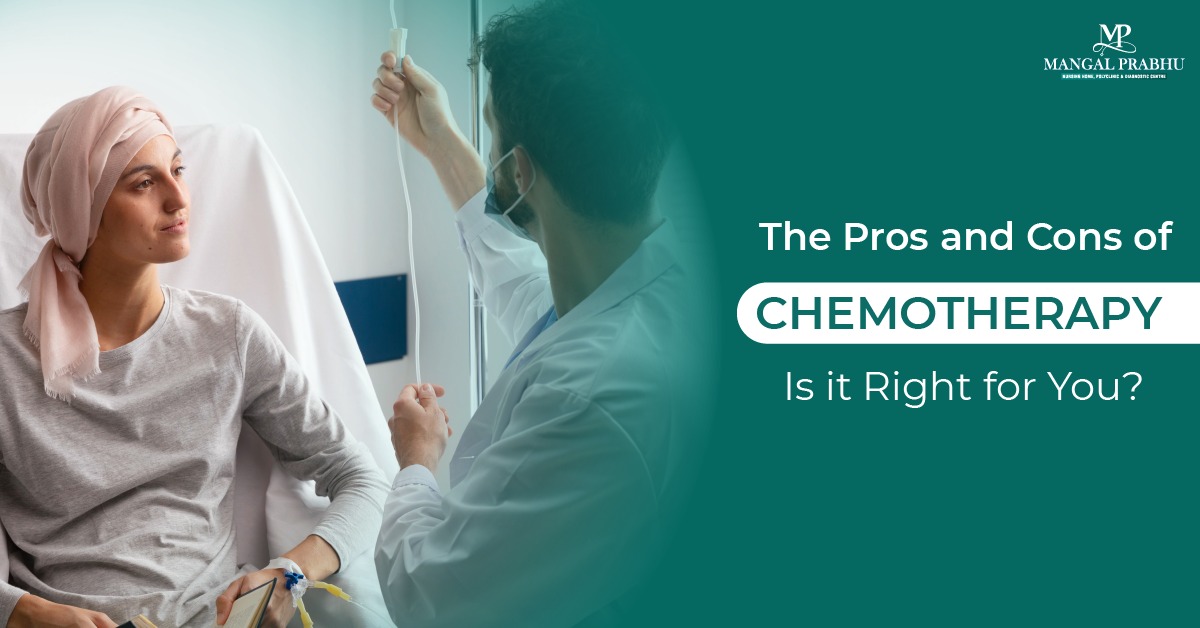
The Pros And Cons Of Chemotherapy: Is It Right For You?
Chemotherapy is the most effective treatment plan for treating and killing cancer cells by preventing their slowing and spreading growth. It is the most common cancer treatment to prevent tumor growth and destroy cancer cells. However, this guide will help you understand the advantages and disadvantages associated with chemotherapy so you can also make the right decision.
What is Chemotherapy & How Does It Work?
Chemotherapy is a kind of cancer treatment that is also known as chemo. It includes various drugs and treatment plans such as immunotherapy, hormone therapy, and targeted therapy against different types of cancer. Chemotherapy can also be paired with radiation therapy to cure cancer and ease its symptoms.
Chemotherapy works by destroying the cancer cells and stopping them from spreading. However, Mangal Prabhu Hospital is the best chemotherapy center in Navi Mumbai and uses the best tools and techniques to provide the fastest and most effective treatment. Their oncologist may use chemotherapy in various ways, including neoadjuvant, adjuvant, palliative, and curative therapy.
The Pros of Chemotherapy – Understanding the Benefits
Chemotherapy is very advantageous for cancer patients. Some of the benefits of this treatment are:
- It kills the cancer cells in the early stages of the disease.
- It reduces the intensity of the tumor before radiation therapy or surgery.
- Chemotherapy helps prevent and slow down the growth of cancer cells.
- Help in fighting the cancer cell, and other treatments work better.
- It made surgery possible by eliminating the cancer’s dead cells and reducing its spread.
Also Read: Chemotherapy: Types, Treatment, And Side Effects!
The Cons of Chemotherapy – Possible Side Effects & Risks
Chemotherapy not only kills cancer cells, but it also slows down the growth of healthy cells. It damages healthy cells and may cause side effects. However, some of the most common disadvantages and side effects of chemotherapy are:
- Hair loss
- Mouth sores
- Nausea
- Fatigue
- Patients must visit hospitals regularly to continue therapy, which can be tiring.
- It may not help all cancer patients.
- The recovery time and effects may differ from person to person.
Deciding Whether Chemotherapy is Right for You
Chemotherapy benefits all cancer patients or people with early signs of cancer but has some potential side effects. However, it would be best to decide and ask your loved ones whether you should start chemotherapy to treat your issue. It is the most effective way to treat cancer and may be very important for patients who do not need immediate treatment, such as prostate cancer or indolent lymphoma.
However, your physician may recommend chemotherapy if there is a sign that your cancer may grow in the future to prevent the cancer cells from spreading, or they may also suggest it if it has already spread to kill harmful cells.
Conclusion
If you have been diagnosed with cancer or it has already spread, it would be best to begin your cancer treatment as soon as possible. However, you can consider the best hematologist oncologist in Navi Mumbai, Mangal Prabhu Hospital, for the best cancer treatment. They offer the highest quality treatment with their standard healthcare plan at an affordable price, so everyone can get the best treatment without worrying about anything.
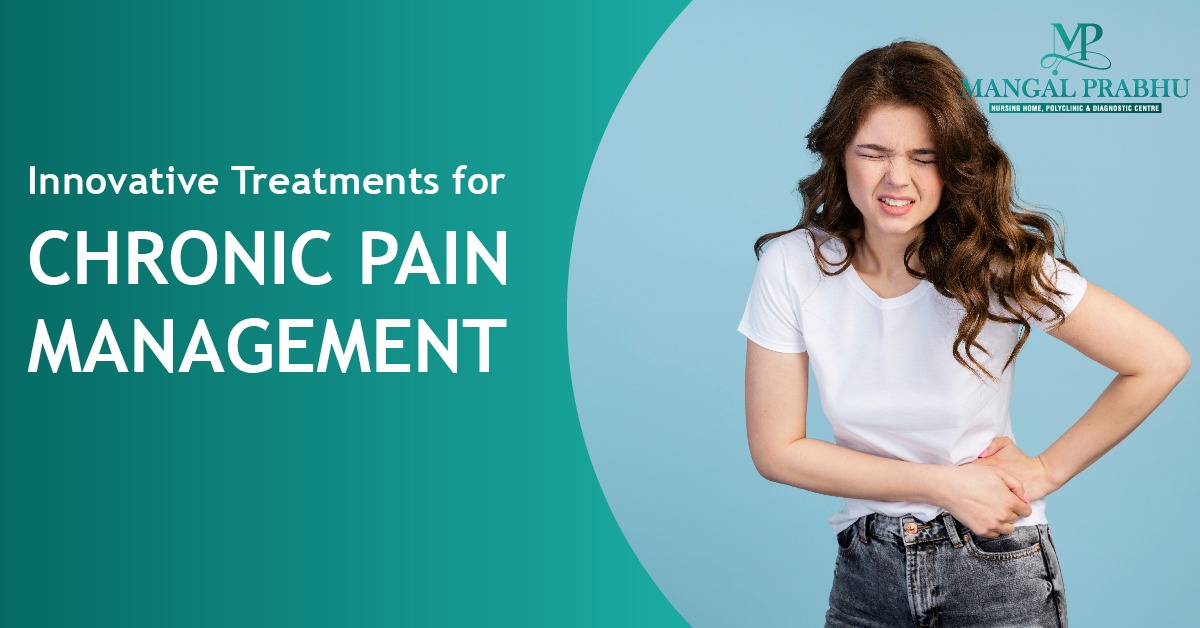
Innovative Treatments for Chronic Pain Management
Pain that lasts for months falls into the chronic pain category. Depending on the underlying cause of the pain, it may or may not be cured. Treatment can, however, relieve your symptoms. A suitable treatment for chronic pain depends on how long you have been suffering from pain, how severe it is, and where it hurts. You can discuss your treatment options with a general physician in Navi Mumbai.
Understanding How Innovative Treatments Work to Manage Your Pain
Fortunately, treatment for chronic pain has evolved a lot in the last few years. There are multiple options available for those who want a permanent cure for the issue. These alternatives to the traditional pain management system, like painkillers, tend to last longer and have little to no side effects, making them a safe option for people of all ages.
From pain shots to Radiofrequency Ablation procedures, there are many options. Let’s explore the most common innovative treatments for chronic pain relief.
Also Read: Common Joints & Muscle Injuries
What Are the Most Common Innovative Treatments for Chronic Pain Relief?
1. Radiofrequency Ablation:
Also called Rhizotomy, radiofrequency ablation is a non-invasive medical procedure that aims to minimize your pain using heat. A specific needle that’s heated is used close to the nerves that send the pain signal to the brain. Once the heated tip zaps the nerve, the pain signal is obstructed and the patient will feel normal. It works for arthritis, hip and joint pain, neuropathy, and other illnesses. The results last 12 months and longer.
2. Pain Shots:
The pain relief medication is injected directly into the area where it hurts. An X-ray and other tests might be performed to identify the problematic area before injecting pain shots. The type of medication used depends on the cause of the pain. Usually, it’s a combination of painkillers that numb the area and steroids, which lower inflammation.
3. Other Meds:
Opioids have long been used to treat chronic pain in patients, but a higher dosage of them can cause adverse effects. It’s a non-invasive treatment. The medication is prescribed to patients with extreme and unbearable pain. While these are quite effective in blocking the pain-inducing signal transmission to the brain, they come with side effects and complications when taken with alcohol and drugs. Addiction, for instance, is a common side effect of Opioids.
The Pros & Cons of Using Innovative Treatments to Manage Chronic Pain
The above-mentioned innovative treatments to control chronic pain have been proven useful for cases with extreme pain, however, these may not always be the suitable choice for every patient. For conditions like arthritis and neuropathy, radiofrequency ablation can be a reliable option, but for moderate pain, aspirin, and ibuprofen are the best. However, remember that each treatment method comes with its share of risks. Before you consider any, discuss your health goals with a specialist.
Conclusion
For some people, chronic pain is an irreversible issue that has no cure. But, with the right treatment, you can manage the pain and make your life better. Visit a private hospital in Navi Mumbai to explore other innovative treatments for pain management.
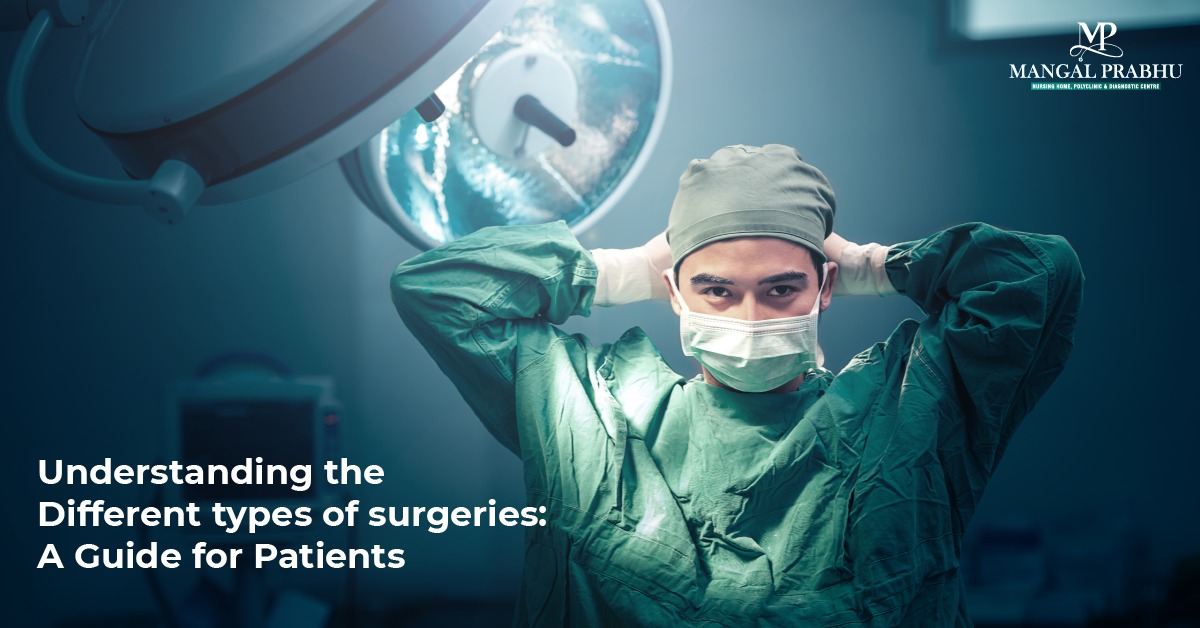
Understanding the Different Types of Surgeries: A Guide for Patients
With every different condition, there are also additional surgeries to eliminate the problem and improve the patient’s body’s functioning. It is classified in several ways, including location in the body, magnitude, and type of conditions such as oncologic, neurologic, orthopedic, etc. However, this guide will help you understand some of the most common surgical operations and know which surgery you need.
The Importance of Different Types of Surgeries
Every surgery has a different significance for a patient and is done for various reasons, which can be the following:
- Repair or remove damaged organs or tissues
- Transplant organ or tissue
- Redirecting blood vessels
- Improve physical appearance
- Eliminate an obstruction
- Implant electronic or mechanical devices
Types of Surgeries
Various types of surgeries vary according to the patient’s condition and complexity. However, here are some of the most common surgeries.
1. General Surgery
It is a surgical operation that concentrates on abdominal contents and the alimentary canal, such as the stomach, esophagus, large intestine, small intestine, appendix, pancreas, thyroid, gland, etc. General surgery also deals with soft tissue trauma, skin, breast, etc. Some examples of general surgery are hernia surgery, endocrine surgery, and appendectomy.
2. Orthopedic Surgery
It is a branch of surgery that deals with musculoskeletal conditions. It effectively treats sports injuries, infections, spine disorders, conventional disorders, etc. bone tumor surgery, joint reconstruction, rheumatoid surgery, and sports surgery are some examples of orthopedic surgery.
3. Cardiothoracic Surgery
It is a surgical procedure that treats internal organs in the thoracic cavity. Cardiothoracic surgery usually treats issues with the lungs, heart, and other mediastinal or pleural structures. Cardiothoracic surgery, cardiac surgery, cardiovascular surgery, and congenital heart surgery are some examples of cardiothoracic surgery.
4. Neurosurgery
It is a field of medicine that deals with the surgical operation of the nervous system. It primarily treats issues related to the spinal cord, brain, and nerves. Traumatology, neuro-oncology, pediatric neurosurgery, spinal surgery, and skull-base surgery are some of the most common examples of neurosurgery.
Procedures for Each Type of Surgery
As every issue requires a different type of surgery, the procedure for each surgical operation also differs.
General Surgery Procedures:
The general surgery procedure includes preparation, tests, recovery, after-surgery pain management, and discharge planning. However, you can get the following common practice of a general surgeon in Navi Mumbai in Mangal Prabhu Hospital.
- Appendectomy
- Gallbladder Removal
- Hernia Repair
Orthopedic Surgery Procedures:
The orthopedic surgeon works on the following diagnosis and procedures for orthopedic surgery.
- Joint Replacement
- Spine Surgery
- Arthroscopy
Cardiothoracic Surgery Procedures:
Cardiac surgeons and cardiologists work well together to treat different cardiological issues. However, a cardiac surgeon may offer some common surgical services and procedures.
- Heart Bypass Surgery
- Heart Valve Replacement
- Lung Surgery
Neurosurgery Procedures:
Neurologists use advanced tools and technologies and offer the following procedures and services to treat neurological conditions.
- Brain Tumor Removal
- Spinal Cord Surgery
- Deep Brain Stimulation
Conclusion
If you are also looking for the best place to do your surgery without any severe complications, you must consider Mangal Prabhu Hospital. It is a prominent multispeciality hospital In Navi Mumbai that offers various treatment plans, surgeries, and the best medication.
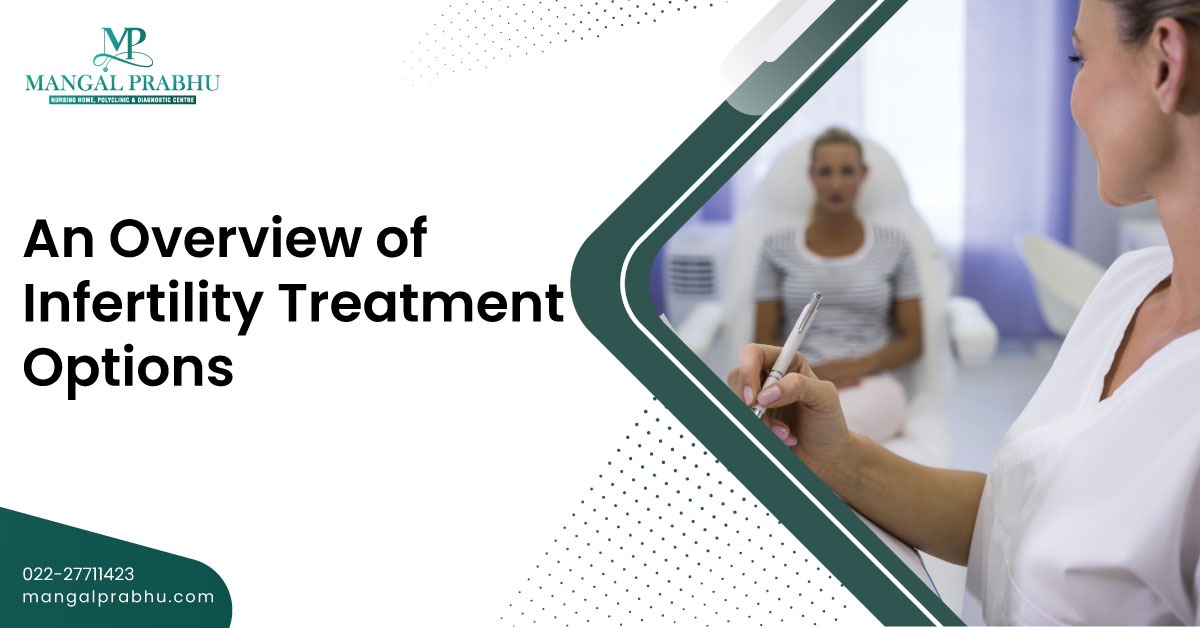
An Overview of Infertility Treatment Options and It’s Effectiveness
Treatment for infertility refers to medical procedures intended to aid single people or married couples in becoming parents. Many causes, including as hormonal imbalances, structural abnormalities, and genetic problems, might contribute to infertility.
A variety of medical and assisted reproductive technologies (ART) that can assist single people or married couples in becoming parents are included in the broad category of infertility treatment. Depending on the underlying reason of infertility, there are a variety of treatments available, including:
Following are the Treatment Options Available for Infertility:
1. Changes in Lifestyle:
In some circumstances, altering one’s lifestyle can assist increase fertility. This can entail losing weight, consuming less alcohol and coffee, giving up smoking, and managing stress.
2. Medication:
Fertility drugs can control ovulation and increase the likelihood of pregnancy. Gonadotropins, aromatase inhibitors, and clomiphene citrate are possible examples of these drugs.
3. Surgery:
In order to treat diseases like endometriosis, fibroids, or obstructed fallopian tubes, surgery may be advised.
Also Read: 10 MOST COMMON PREGNANCY SYMPTOMS AND HOW TO MANAGE THEM
4. Intrauterine Insemination (IUI):
At ovulation, intrauterine insemination entails injecting sperm directly into the uterus. When a couple has a certain form of infertility, this can increase their chances of getting pregnant.
5. Invitro Fertilization (IVF):
The process of in vitro fertilisation, also known as IVF, entails fertilising an egg with sperm in a lab before transporting the resulting embryo to the uterus. For couples experiencing different types of infertility, IVF can be a successful therapy choice.
6. Intracytoplasmic Sperm Injection (ICSI):
In this procedure, a single sperm is injected into an egg’s cytoplasm in a lab setting. For couples with male factor infertility, this may be beneficial.
7. Donor Eggs or Sperm:
In situations where one partner has fertility problems or there are genetic concerns, donor eggs or sperm may be used.
8. Surrogacy:
This may be a possibility if a woman is unable to carry a pregnancy. To do this, a surrogate will be used to carry the pregnancy to term.
The underlying reason of infertility, the type of treatment, the patient’s age, and their state of health are just a few of the variables that might affect how effective an infertility treatment is. Depending on the technique of treatment and the patient, the success rates of infertility treatments can often range from 5% to 60%.
According to a n Infertility Hospital in Navi Mumbai, couples can also successfully conceive with the aid of assisted reproductive technologies (ART), such as intrauterine insemination (IUI), in vitro fertilisation (IVF), and intracytoplasmic sperm injection (ICSI). The success rate of ART varies based on the patient’s age, the quantity of embryos implanted, and the underlying cause of infertility.
Conclusion:
Overall, there are numerous variables that might affect the success rates of infertility treatment, so it’s critical to consult closely with a healthcare professional or fertility specialist to choose the best course of action for your particular situation.
